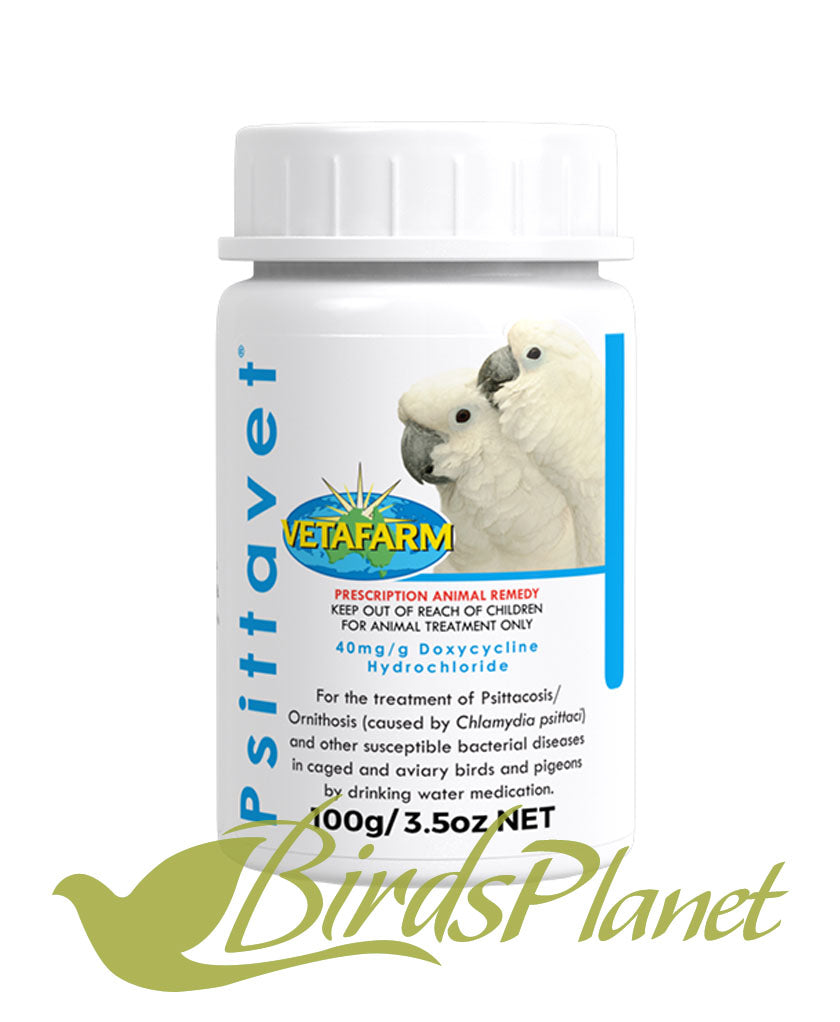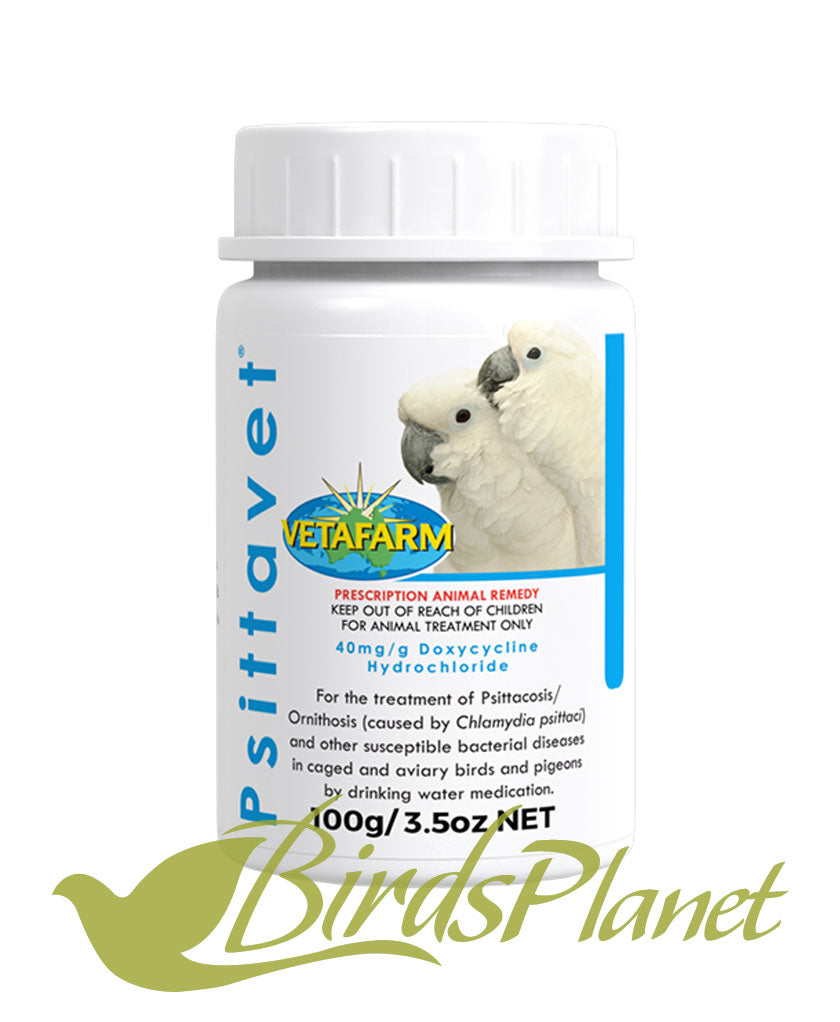Vetafarm Australia
Psittavet
Psittavet
Couldn't load pickup availability
Vetafarm Psittavet is for the treatment of psittacosis/ornithosis (caused by chlamydia psittaci and other susceptible bacterial diseases in caged and aviary birds and pigeons by drinking water medication.
Weight: 100g
Directions:
Parrots: 4 g in 400 mL drinking water
Pigeons: 4 g in 800 mL drinking water
Do not treat during cold wet conditions (birds drink very little). Use glass, stainless steel, or glazed pottery water drinkers (do not use terracotta, plastic, or galvanized metal). Do not place medicated water in direct sunlight. Shade or shelter containers.
Replenish water in the evenings, not mornings. This allows birds access to the active medication before roosting and at first light.
Psittavet may be made up and stored in the refrigerator for 7-10 days. Do not mix other chemicals with Psittavet - it is a fragile chemical. Other Applications Psittavet may be used wherever Doxycycline is indicated. Check with your veterinarian. Psittacosis is a zoonosis (a disease that affects animals and man). Appropriate precautions should be used when handling birds with psittacosis.
Ingredients:
Doxycycline Hydrochloride
Guaranteed Analysis:
Doxycycline HCL 4%
Vetafarm Article:
Psittacosis (also known as "parrot fever", ornithosis, or chlamydiosis) is a widespread disease caused by an organism called Chlamydia psittaci. The pet bird owner may be increasingly aware of the prevalence of psittacosis, but that is believed due to improved diagnostic methods rather than actual disease incidence.
PSITTACOSIS IN PET BIRDS
The chlamydial organism commonly occurs in wild populations of numerous bird species, however, the clinical disease is precipitated by man-made stresses such as transport, changes in feed or environment, and intensive breeding practices.
Transmission of psittacosis is primarily by inhalation of infected dust from droppings or feathers and is enhanced by close contact with sick birds that are shedding the organism. For this reason, the disease is most often seen in birds that have been recently transported, housed in pet shops, or boarded with other birds.
TREATMENT
If psittacosis has been diagnosed in one of your birds, your veterinarian may recommend treatment of all exposed and potentially infected birds. To reduce the spread of the disease the patient must be, isolated from other birds on the premises.
Although PSITTAVET is generally believed to be efficacious in treating chlamydiosis, the success of the treatment depends upon the species, age, presence of concurrent infections and immune status of the patient. Medication can be given by direct oral administration, by injection, as medicated pellets, or mixed in soft foods.
The specific medication and route of administration are left to the discretion of the veterinarian. Unless the birds are already accustomed to a pelleted diet, the use of medicated pellets is not appropriate as the stress involved in converting to a new diet may exacerbate the disease. The treatment period will last a minimum of 45 days. Depending on the condition of the patient, other forms of supportive therapy may be necessary. There is no immunity to the disease, and birds are susceptible to reinfection even after full recovery or previous treatment.
During treatment, the owner is advised to:
- Exercise caution in the handling of bird droppings
- Keep circulation of feathers and dust to a minimum
- Separate and isolate any other birds that may show beginning signs of the disease
- Avoid contact with birds by elderly, pregnant, sick, or very young persons, especially in the early stages of the treatment
- Reduce stresses in the bird's environment.
CLINICAL SIGNS
There are no specific signs that are characteristic of psittacosis. Some birds may show general "sick" symptoms - lack of appetite, weight loss, depression and listlessness, watery green droppings, discharge from eyes or nares, or even sudden death. Of course, these signs may be related to diseases other than psittacosis. Many birds carry the chlamydial organism but do not show any signs of the disease under stable conditions. These birds may become sick after some stressful occurrence, or breeding birds may pass the organism to their offspring who may die in the nest or at weaning. Young birds are more susceptible to a debilitating infection than adult birds. Birds do not have to show symptoms of disease to transmit chlamydia.
DIAGNOSIS
A positive diagnosis of chlamydiosis in a live bird is sometimes very difficult, depending on the species, length of time since exposure, and general condition of the bird. In addition to having the capability of producing disease on its own, chlamydia undermines the immune system and opens the body to a host of other pathogens; thus, bacterial or viral disorders may occur at the same time. Because it is far easier to diagnose a bacterial problem, chlamydiosis may be missed.
A chlamydiosis screening test is available (CLEARVIEW TEST)- this can be performed by an avian veterinarian. Your avian veterinarian may be able to make a presumptive diagnosis of psittacosis based on history, clinical signs, X-rays, blood work, or other diagnostic methods. If psittacosis is suspected, treatment should begin at once, even as confirmatory tests are being run.
Psittacosis
Further testing of affected birds is advised following therapy, as the treatment may not be fully effective, even though clinical signs abate. In extreme cases, especially those involving aviaries with significant losses, euthanasia may be necessary for individual birds if multiple tests indicate a persistent infection after repeated treatment attempts.
PREVENTIVE MEASURES
The following recommendations help prevent psittacosis in flocks or household pets:
1. Take all new birds to a qualified avian veterinarian immediately after purchase for chlamydiosis screening tests.
2. Buy birds from reputable suppliers who screen for the presence of chlamydia. An avian veterinarian in your area may be able to recommend a quality source.
3. Isolate all newly acquired birds for at least 6 weeks.
4. Periodically monitor breeding flocks for chlamydiosis.
PSITTACOSIS IN HUMANS
The chlamydial organism is capable of being transmitted from birds to humans, but this rarely occurs despite the relatively high incidence of infection in birds. Although psittacosis infection in humans is normally mild, it is potentially dangerous for persons who are sick, elderly, or immunosuppressed (e.g. AIDS patients). Persistent "flu-like" symptoms such as fever, chills, headache, weakness, fatigue, and respiratory signs may be experienced. Anyone who is exposed to pet birds and who develops a prolonged case of the flu should seek the advice of a physician because the condition in humans may be misdiagnosed.
Share

Collapsible content
Shop from our Physical Store
BirdsPlanet (Pet store)
16-C, Abul Hassan Isfahani Road, Near Mobilink Franchise, Faisal Town Lahore.
Call/ Whatsapp 03351419323, 03008874039, 03111222845
Model Town Birds Planet 53 C, Bank Square Market Model Town Lahore Pakistan
Cell / Whatsapp 03202020377 info@birdsplanet.pk
Raiwind Road BirdsPlanet 20 Mehran Chinar Bagh Raiwind Road Lahore Pakistan
Call/Whatsapp 03008874039 and 03111-222-845
Samanabad Bird Charm LOS Road Samanabad Lahore Pakistan
Call/Whatsapp 03047756584
Landline: 042-35160016
Our Timing
Monday to Saturday: 10am to 9pm
Share information about your brand with your customers. Describe a product, make announcements, or welcome customers to your store.

